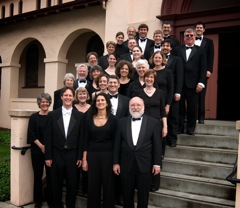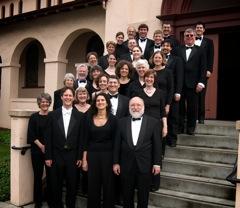
On a drizzling Sunday, California Bach Society performed the final concert of its program at St. John’s Presbyterian Church in Berkeley, offering two gems of the English vocal repertory: Henry Purcell’s ode Hail, Bright Cecilia (1692) and George Frideric Handel’s Acis and Galatea, a masque (1718). Or is it a pastoral? Or, as Handel once described it, a little opera?
Whatever the genre, the Bach Society’s cheerful demeanor and an attentive audience belied the sullen weather.
Purcell’s ode was the more seasonable celebrant of the two. Saint Cecilia’s Day’s later in autumn (Nov. 22) is a holiday for music in England. In 1692, the Gentlemen Lovers of Musick commissioned Hail, Bright Cecilia. Three years later, Purcell was dead, possibly from pneumonia.
The overall effect of the work, which settles in quickly by the first few of the 13 sections, lies in how much music the composer fits in. It has both sweep and intensity. The Bach Society, with Music Director Paul Flight at the podium, laid it out well, giving a sense of the sweep of the music, if not always of its dynamic intensity. (Flight, a well-known countertenor, stepped down to sing the alto solo and duets, some of the more intense singing in the piece.)
The 14-piece orchestra opened well with the Symphony, the two trumpets signaling Baroque magniloquence, with the strings taking over quickly enough, dropping to more languidly reflective sonorities, which the woodwinds complemented. Before long, the timpani and brass were marching forward in a processional. The spigot really was turned on, though, with Jeffrey Fields’ bass solo. Fields demonstrated what’s had him singing occasionally with American Bach Soloists as well as the Society. And on “Hark! Hark! Each tree its silence breaks,/The box and fir to talk begin!” Flight joined in duet with Fields, with intertwining, ornamented ascending and descending lines — one of the nicest moments of the piece.
Bright Cecilia unfolded well, with the clear, harmonious soprano of Ann Moss and Brian Thorsett’s rhythmic tenor adding more variety to a variegated piece. Tony Mauro also stepped out from the chorus to join Fields in the delightful duet of deep voices, “Let those amongst themselves contest/Which can discharge its single duty best.”
Though in many ways it was given a satisfying performance for the audience, Bright Cecilia didn’t quite ring out past the bounds of its period decorum. It sounded like a concert, a little tentative, even at moments peremptory.
Both the company and the audience proved game. During the intermission, with displays about the Society’s 40-year history, and with former music directors present, singers were commenting favorably on the energy in the room and the sanctuary’s acoustics, and soon came back smiling, at full pitch for the Handel.
Unfolding a Rose
The chorus, immediately showing a new depth and variety, launched into “Oh, the pleasure of the plains.” By the time, a few moments later, when Ann Moss ascended as the “semi-divine nymph” Galatea and added her crystalline sound to the chorus, the weather outside was forgotten; inside, it was a sylvan, spring day as voices and instruments wound and unwound in musical gamboling.
Moss and Thorsett (as shepherd Acis: “Aces”) came alive; Fields, as the one-eyed giant, Odysseus’ old pal, with overwrought grins and sullen frowns, was a comical Polyphemus, turning wayward and dangerous when he raged, melted, and burned (or started verbally throwing things) — yet deceptively charming, energetic yet sweet the next moment, with “O ruddier than the cherry,/O sweeter than the berry,/O nymph more bright/Than moonshine night,/Like kidlings blithe and merry.”
The excellent program notes tell us that the lyrics for Handel’s “little opera” were influenced by Dryden’s translation of Ovid, penned probably by John Gay (of Beggar’s Opera fame). They may have been added to by Alexander Pope and others, giving Baroque contrast a touch of Rococo light wit.
A high point of the concert, with the oboes once again doubling on recorders, was the recurrent sopranino recorder, like an “oaten pipe,” tootling over a solo voice: pastoral indeed.
After the elegiac conclusion, when Acis (smashed by the giant with “this massy ruin,”) tastes immortality, thanks to Galatea — now a fountain — and her runny sacrifice, the audience broke into hearty applause, bringing to an end a happy, rainy Baroque afternoon.

